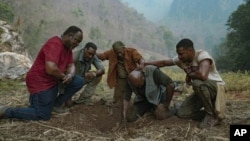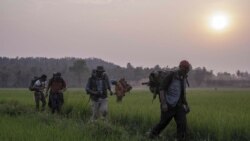American film director Spike Lee’s “Da 5 Bloods” has just been released on the streaming service Netflix. It is a film about four African American Vietnam War veterans who return to Vietnam years later.
Lee says there was not enough money in his Netflix budget for costly special effects. But critics say the film’s extraordinary creativity and powerful sense of purpose can be seen as special effects, too.
As a filmmaker, Lee is known for having good timing. That may be clearer than ever with the release of “Da 5 Bloods.” It comes during a growing national movement demanding racial justice and an end to police brutality.
“Da 5 Bloods” shows powerful images of the political and social events of the 1960s. The film begins with historical clips from the Vietnam War and shows the experience of African American soldiers in the war.
In one 1968 clip, activist Bobby Seale recalls how African Americans served in the Civil War and then World War II, with their freedom still not a reality. “And now here we go with the...Vietnam War and we still ain’t getting nothing but racist police brutality…” Seale said.
Lee made a major change to the original “Da 5 Bloods” story, written by Danny Bilson and Paul DeMeo.
Lee and writer Kevin Willmott changed the Vietnam veterans to be African American. Lee wanted to make a Vietnam film that had not yet been made -- one in which African American soldiers were the main story, not just a side story.
The original story had the four veterans returning to Vietnam to find buried gold. In Lee’s version, they are looking for gold as well. But they are also looking for something else: the body of their beloved army group leader, “Stormin’ Norman.” Actor Chadwick Boseman plays Stormin’ Norman in Lee’s film.
Film lovers will notice references to other films, such as Francis Ford Coppola’s “Apocalypse Now.” It is at a place named “Apocalypse Now” in Vietnam that the four Veterans have drinks one night before going into the jungle.
“Apocalypse Now” is a real bar in present-day Ho Chi Minh City.
At the bar, the men discuss their experiences as Vietnam War veterans. They talk about coming back from an unpopular war and being called “baby killers” while also facing racial discrimination.
The angriest of the four veterans is Paul, played by actor Delroy Lindo. Paul is a strong supporter of American President Donald Trump and wears a red Make America Great Again hat. He has a troubled relationship with his son, David, played by Jonathan Majors. David appears in the film right before the jungle trip. He then joins the group on the trip.
There is also the happy Melvin, played by Isiah Whitlock Jr. And there is Otis, played by Clarke Peters, who has an important reunion with a former lover. And there is Eddie, played by New York theater star Norm Lewis. Eddie is the friendly owner of several car dealerships. But he is clearly hiding something behind his big smile.
With help from a mysterious man involved in international exports, the men take a riverboat to look for the buried gold. They soon find it. And they find a lot of other things, too. A lot goes wrong.
The men are not alone as the movie continues. For example, there is a group of men who look for land mines. There is a group of Vietnamese officers, a travel guide and a former lover. There is also intense jungle heat, poisonous snakes and dangerous unexploded mines.
The film goes between the present day and wartime flashbacks, without using different makeup on the actors. This is meant to make the audience understand exactly how the men themselves are experiencing the flashbacks.
By the end of “Da 5 Bloods,” audiences are likely to feel that, undoubtedly, it is the right movie at the right time.
I’m Jonathan Evans.
Jocelyn Noveck wrote this film review for The Associated Press. Alice Bryant adapted it for Learning English. Ashley Thompson was the editor.
________________________________________________________________
Words in This Story
streaming - adj. playing continuously as data is sent to a computer over the Internet
brutality - n. cruel, harsh and usually violent treatment of another person
flashback - n. a part of a story or movie that describes or shows something that happened in the past
clip - n. a short section of a video, movie, or TV show
original - adj. happening or existing first or at the beginning
reference - n. the action of mentioning or alluding to something
jungle - n. a tropical forest where plants and trees grow very thickly
bar - n. a building or room where alcoholic drinks and sometimes food are served
snake - n. an animal that has a long, thin body and no arms or legs
makeup - n. materials (such as wigs or cosmetics) that are used to change the appearance of an actor






